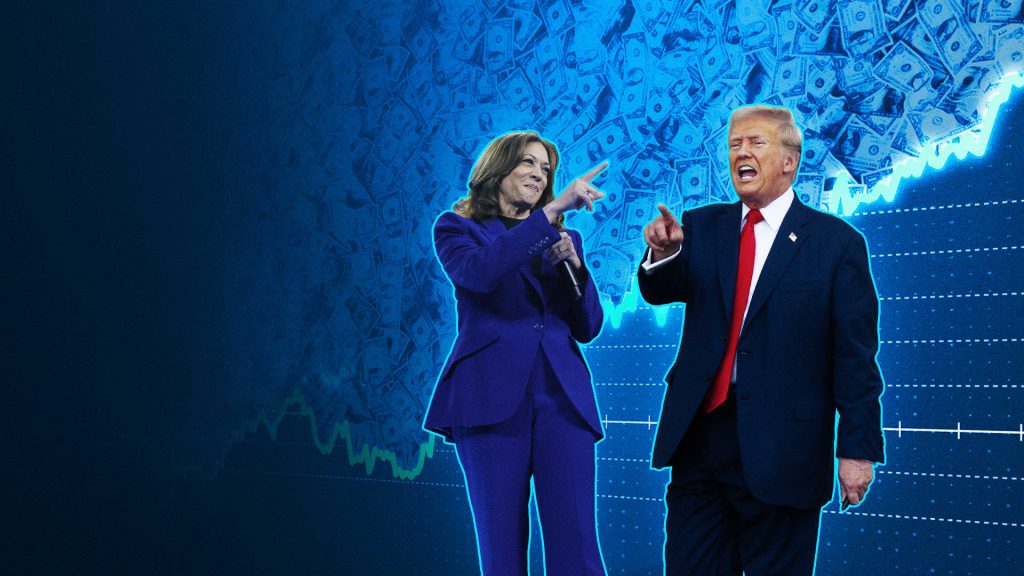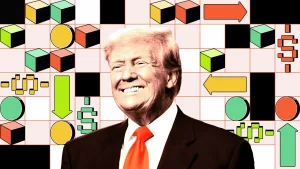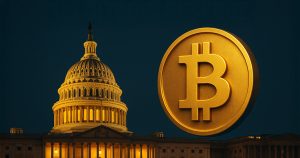How Crypto Investors Are Preparing for US Election 2024?

Highlights
- Crypto lobbyists are driving bipartisan support in Congress with over $160 million invested in federal election campaigns.
- Investors are fueling funds that track Bitcoin, speculating on Trump’s re-election and preparing for heightened price volatility.
- The prediction market platform Kalshi is attracting crypto traders by accepting USDC stablecoin deposits.
As the 2024 Presidential Election approaches its climax, crypto’s prominent role is overshadowing the increasing influence and preparation of crypto investors and lobbyists regarding the next Congress.
Crypto investors and policymakers have already invested over $160 million in this election cycle. They should anticipate a bipartisan influx of lawmakers who support crypto in both chambers. Many candidates poised to win House seats will contribute to a growing pro-crypto voting bloc.
This new bloc will provide essential support for an industry that has primarily been on the defensive under the Biden Administration and SEC Chair Gary Gensler. As these candidates take office, they are likely to advocate for policies that favor the crypto sector, shifting the balance of power in Congress.
The significant financial backing from crypto investors has begun to reshape the political landscape, encouraging more candidates to embrace pro-crypto stances. This influx of funding signals a robust commitment to ensuring that lawmakers prioritize the interests of the crypto community.
As the election results come in, the crypto industry can expect to see a clearer alignment with congressional priorities. With more allies in Congress, the potential for favorable legislation increases, creating an environment that could facilitate growth and innovation within the sector.
The push for a pro-crypto agenda aligns with broader economic trends, where digital assets are gaining traction among investors. Policymakers who recognize the importance of these assets are likely to support initiatives that foster technological advancements and financial inclusivity.
Crypto investors are not just passive observers; they are actively engaging in the political process to ensure their interests are represented. This proactive stance includes funding campaigns, supporting candidates, and advocating for regulatory clarity.
As the election unfolds, the lobbying efforts of crypto advocates will play a critical role in shaping the future regulatory landscape. Their strategies will focus on addressing concerns raised by regulators while promoting the benefits of blockchain technology and digital currencies.
With a new wave of pro-crypto lawmakers entering Congress, the industry’s resilience will be tested. However, the momentum built through strategic investments and lobbying efforts may well position the crypto sector for a more favorable legislative environment.
Ultimately, the combination of substantial financial investment and strategic political engagement will determine how effectively crypto advocates can influence the upcoming Congress and navigate the evolving regulatory landscape.
Crypto Investors Bet on Trump Win, Brace for Bitcoin Volatility
Crypto investors are betting on a Donald Trump comeback to the White House, pouring money into funds that track Bitcoin while preparing for significant volatility in the cryptocurrency during election week.
Reports indicate that ETFs tracking the spot price of Bitcoin experienced net inflows of $917.2 million on Wednesday, marking the highest single-day increase since March.
BlackRock’s iShares Bitcoin Trust ETF led the charge, attracting $872 million in net inflow, the highest one-day total since its launch in January. This surge positions it as the most prominent spot Bitcoin fund by assets under management, with a total inflow of $2.2 billion in just one week, surpassing 13,227 similar funds worldwide.
Bitcoin’s price jumped 13.6% in October as speculation surrounding Trump’s pro-crypto candidacy gained traction. Analysts at Ryze Labs noted that the increasing likelihood of a Republican sweep has sparked optimism for crypto-friendly legislation in Congress following the election.
While polls indicate a competitive race between Trump and Democrat Kamala Harris, betting markets like Polymarket assign significantly higher odds to a Trump victory. This uncertainty in the political landscape has led future markets to brace for a turbulent election week.
According to forward-implied volatility data from the crypto derivatives exchange Deribit, Bitcoin could experience daily price swings of around 3.7% in either direction leading up to November 8. This potential for volatility reflects the heightened anticipation surrounding the election outcome.
Crypto investors are clearly positioning themselves to take advantage of the expected price movements. By investing heavily in Bitcoin-tracking funds, they aim to capitalize on both Trump’s potential victory and the market fluctuations that may accompany it.
The influx of capital into Bitcoin funds signals a growing confidence among investors in the cryptocurrency’s resilience, particularly in the face of political uncertainty. As the election draws near, this confidence could lead to further investments in the sector.
Ultimately, the intersection of political developments and market dynamics is creating a unique environment for crypto investors. Their strategies will likely evolve as they respond to the unfolding election results and the implications for Bitcoin’s price.
In this high-stakes scenario, crypto investors are not only betting on a political outcome but also preparing for the resulting volatility in one of the world’s most significant cryptocurrencies.
Crypto Community Eyes Influence in 2024 Election Amid Regulatory Battle
The crypto community, which includes a variety of startups and venture capitalists, faces a standoff with the federal government over the classification of crypto as an asset. They are also debating which regulatory agency—either the SEC or the Commodity Futures Trading Commission—should oversee the industry.
In 2024, crypto advocates are amplifying their political influence, with nearly half of all corporate donations to federal election campaigns originating from crypto supporters. According to the advocacy group Public Citizen, crypto companies and notable investors have contributed over $119 million directly to federal races this year.
While Donald Trump actively courts crypto enthusiasts by launching his own crypto initiative, Kamala Harris adopts a more neutral stance toward the industry. The Biden administration, particularly under SEC Chair Gary Gensler, has enforced strict regulations that many in the crypto space view as detrimental.
Despite this, Harris seems willing to engage with the crypto community. Reports indicate that Chris Larsen, co-founder and chairman of Ripple, has donated more than $11.8 million to political action committees (PACs) supporting her campaign. This financial backing highlights the industry’s interest in fostering connections with key political figures.
A pressing concern for many in the crypto sector revolves around who will succeed Gensler as a regulatory authority. Both Larsen and another Ripple executive, Brad Garlinghouse, are particularly interested in this outcome, as they have recently hired influential attorneys to contest claims in the XRP-SEC lawsuit.
The crypto community’s focus on political engagement underscores their desire for more favorable regulatory conditions. By increasing their contributions and influence, they aim to ensure that future regulations support innovation and growth within the industry.
As the election approaches, the dynamics between crypto advocates and political candidates will likely evolve. Candidates who recognize the potential of crypto could gain significant backing from the community, shaping their platforms and policies accordingly.
The outcome of the 2024 election could have lasting implications for the regulatory landscape surrounding crypto. A shift in leadership at the SEC could open the door for more favorable treatment of digital assets.
In this charged environment, the crypto community is keenly aware of the stakes involved. They are mobilizing resources and forming alliances to navigate the complex interplay between politics and regulation.
Ultimately, the crypto community is poised to play a significant role in the 2024 election, leveraging their financial clout and advocacy efforts to influence key decisions that will shape the future of the industry.
Kalshi Targets Crypto Traders as Election Betting Surges, Launches USDC Deposits
Kalshi is actively courting crypto investors and traders as interest in political betting on the US election surges, according to its CEO. The prediction market platform started accepting deposits in USDC stablecoin on Monday, enabling US-based traders to wager on the outcomes of presidential and congressional races.
This update significantly increased trading volumes on Kalshi, positioning the startup as a serious competitor to the crypto-native prediction market, Polymarket.
Within just 36 hours of opening USDC deposits, Kalshi saw over $20 million flow in from nearly 21,000 users, marking its largest inflow in such a brief period. Jack Such, the Head of Market Research, highlighted that this surge reflects strong engagement from retail users, alongside increased participation from institutional players and crypto investors, including traditional finance brokerages that offer crypto services.
Kalshi’s integration of crypto does not stop with USDC deposits. The partnership with Zero Hash for USDC transactions represents only the beginning of its plans to enhance its platform.
The company has also recently announced a new collaboration with the decentralized data marketplace Stork, aiming to take its prediction market data on-chain. This move will further strengthen its technological capabilities and appeal to a broader audience.
By integrating crypto functionalities, Kalshi is positioning itself to capture the growing interest in both political betting and digital assets. The platform’s initiatives suggest a keen awareness of market trends and user preferences.
As political betting gains traction, Kalshi’s ability to attract a diverse range of users will be crucial to its success. The influx of capital from various sources indicates a robust appetite for innovative betting options in the current political climate.
Kalshi’s proactive approach to partnerships and technology integration may set it apart in a competitive landscape. By leveraging the advantages of blockchain technology and stablecoins, the platform is poised to enhance user experience and trust.
Overall, Kalshi’s focus on crypto integration reflects a strategic move to align with evolving market demands. As interest in political betting and digital currencies continues to rise, the company aims to solidify its position as a leader in the prediction market space.
In this rapidly changing environment, Kalshi is not only meeting current demands but also anticipating future trends, making it an exciting player to watch as the election approaches.











